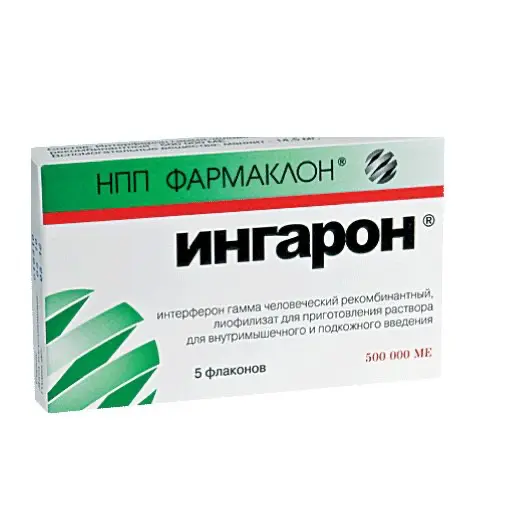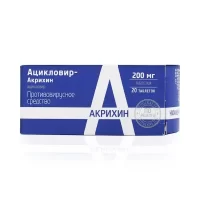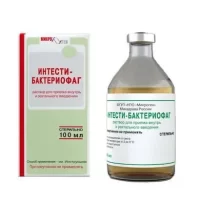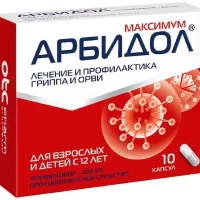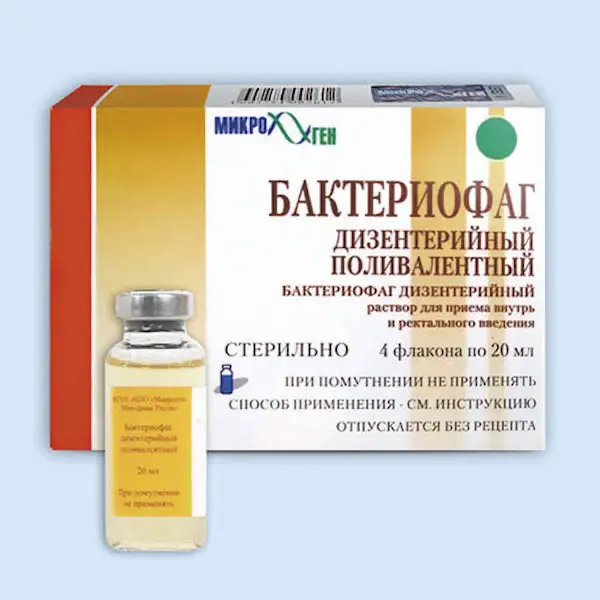Description
Ingaron Pharmacodynamics
Recombinant human gamma interferon consists of 144 amino acid residues and lacks the first three amino acid residues of Cys-Tyr-Cys, which are replaced with Met. Molecular weight is 16.9 kDa. Obtained by microbiological synthesis in a recombinant Escherichia coli strain and purified by column chromatography. Specific antiviral activity on cells (human fibroblasts) infected with vesicular stomatitis virus is 2×10(7) units/mg protein.
Interferon gamma (immune interferon) is the most important proinflammatory cytokine produced in humans by natural killer cells, CD4 Th1 cells and CD8 cytotoxic suppressor cells. Macrophages, neutrophils, natural killer cells, and cytotoxic T-lymphocytes have receptors for interferon gamma. Interferon gamma activates the effector functions of these cells, in particular their microbicidal capacity, cytotoxicity, cytokine production, superoxide and nitroxide radicals, thereby causing the death of intracellular parasites. Interferon gamma inhibits B-cell response, interleukin-4, suppresses production of IgE and expression of CD23-antigen. It is an inducer of apoptosis of differentiated B-cells, giving rise to autoreactive clones. Cancels the suppressive effect of interleukin-4 on interleukin-2-dependent proliferation and lymphokine generation by activated killer cells.
It activates the production of acute phase proteins of inflammation, enhances the expression of genes C2 and C4 components of the complement system.
Unlike other interferons it increases the expression of HCGS antigens of both classes I and II on different cells, and induces the expression of these molecules even on the cells that do not express them constitutively. This increases the efficiency of antigen presentation and the ability of T-lymphocytes to recognize them. Interferon gamma blocks replication of viral DNA and RNA, synthesis of viral proteins and assembly of mature viral particles. Interferon gamma has cytotoxic effect on virus-infected cells.
Interferon gamma blocks the synthesis of beta -TGF responsible for the development of lung and liver fibrosis.
Indications
– Treatment of chronic viral hepatitis C, chronic viral hepatitis B, HIV/AIDS infection and pulmonary tuberculosis in treatment;
– prevention of infectious complications in patients with chronic granulomatous disease;
– treatment of cancer in treatment as an immunomodulator, including in combination with chemotherapy;
– Treatment of genital herpesvirus infection and shingles (Herpes zoster) in monotherapy;
– Treatment of urogenital chlamydia in complex therapy;
– Treatment of chronic prostatitis in complex therapy;
– Treatment of anogenital warts (human papillomavirus) and the prevention of relapse.
Contraindications
– pregnancy;
– autoimmune diseases;
– diabetes mellitus;
– Individual intolerance to interferon gamma or any other drug component.
Administration during pregnancy and lactation
The drug is contraindicated in pregnancy.
Dosage and administration
- Administration of the drug intramuscularly or subcutaneously.
- The contents of the vial should be dissolved in 2 ml of water for injection.
- The drug dose is adjusted individually.
- For treatment of patients with chronic viral hepatitis B, chronic viral hepatitis C, as well as HIV/AIDS infection and pulmonary tuberculosis, average daily dose for adults is 500000 mg. It is given once a day, daily or every other day. The course of treatment is from 1 to 3 months, if necessary the course of treatment is repeated after 1-2 months.
- For prophylaxis of infectious complications in patients with chronic granulomatous disease the average daily dose for adults is usually 500000 ME. It is administered once a day, daily or every other day. The course consists of 5-15 injections; if necessary the course is prolonged or repeated in 10-14 days.
- For the treatment of cancer, the average daily dose for adults is 500,000 ME. It is injected once a day every other day.
- For the treatment of genital herpesvirus infection, shingles (herpes zoster) and urogenital chlamydia the average daily dose for adults is 500,000 ME. It is administered once a day subcutaneously, every other day. The course of treatment is 5 injections.

